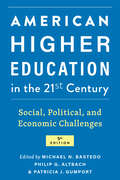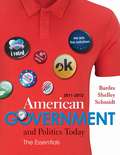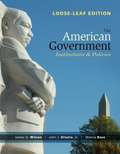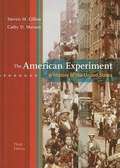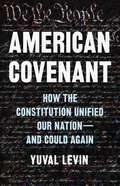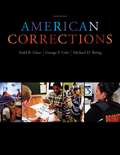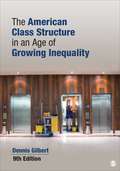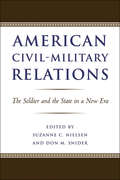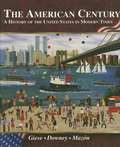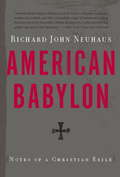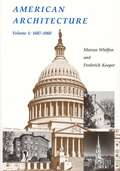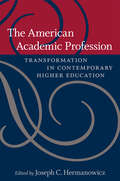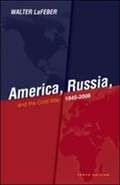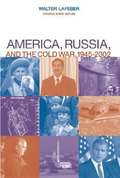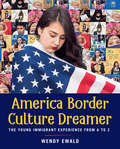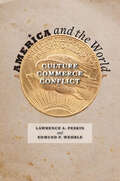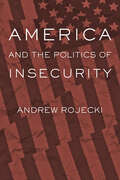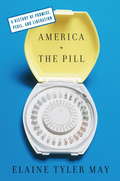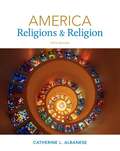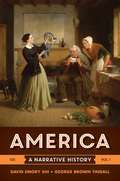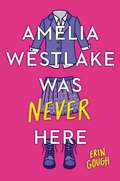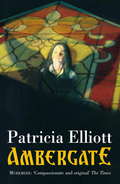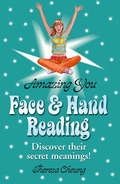- Table View
- List View
American Higher Education in the Twenty-First Century: Social, Political, and Economic Challenges
by Michael N. Bastedo, Philip G. Altbach, and Patricia J. GumportNow in its fifth edition! An indispensable reference for anyone concerned with the future of American colleges and universities.Whether it is advances in information technology, organized social movements, or racial inequality and social class stratification, higher education serves as a lens for examining significant issues within American society. First published in 1998, American Higher Education in the Twenty-First Century offers a comprehensive introduction to the complex realities of American higher education, including its history, financing, governance, and relationship with the states and federal government. This thoroughly revised edition brings the classic volume completely up to date. Each chapter has been rewritten to address major recent issues in higher education, including the COVID-19 pandemic, the movement for racial justice, and turmoil in the for-profit sector. Three entirely new chapters cover broad-access colleges, race and racism, and organized social movements. Reflecting on the implications of ethnic and socioeconomic diversity within higher education, the book also grapples with growing concerns about the responsiveness and future of the academy.No other book covers such wide-ranging issues under the broader theme of higher education's relationship to society. Highly acclaimed and incorporating cutting-edge research, American Higher Education in the Twenty-First Century is now more useful and engaging than ever.Contributors: Michael N. Bastedo, Philip G. Altbach, Patricia J. Gumport, Peter Riley Bahr, Joy Blanchard, Julia Brickfield, Michael Brown, Katherine S. Cho, Daniela Conde, Charles H. F. Davis III, Hans de Wit, Peter D. Eckel, Martin Finkelstein, Denisa Gándara, Liliana M. Garces, Roger L. Geiger, Leslie D. Gonzales, Jillian Leigh Gross, Jessica Harris, Nicholas Hillman, Julia Rose Karpicz, Robert Kelchen, Adrianna Kezar, Lisa R. Lattuca, Demetri Morgan, Rebecca Natow, Anna Neumann, Audrey Peek, Laura W. Perna, Gary Rhoades, Tykeia N. Robinson, Roman Ruiz, Wonson Ryu, Lauren T. Schudde, Jeffrey C. Sun, David A. Tandberg
American Government and Politics Today: The Essentials (2011-2012 Edition)
by Barbara A. Bardes Mack C. Shelley Steffen W. SchmidtThe 2011--2012 edition of American Government and Politics Today: The Essentials contains many pedagogical aids and high-interest features to assist both students and instructors. Some of the features are: The Politics of Boom and Bust; What If?; Margin Definitions; Did You Know?; Which Side Are You On?; Questions for Discussion and Analysis; Key Terms; Chapter Summary; Selected Print and Media Resources; E-mocracy, and many more.
American Government and Politics Today
by Steffen W. Schmidt Mack G. Shelley Barbara A. BardesEach chapter of this book contains new features, updated information and tabular data, and, whenever feasible, the most current information available on the problems facing the nation. The effects of emerging technology, including the Internet, are emphasized throughout.
American Government: Institutions And Policies
by James Q. Wilson John J. Diiulio Meena BoseAcclaimed for the scholarship of its prominent authors and the clarity of its narrative, AMERICAN GOVERNMENT: INSTITUTIONS AND POLICIES sets the standard for public policy coverage while maintaining focus on three fundamental topics: the institutions of American government; the historical development of governmental procedures, actors, and policies; and who governs in the United States and to what ends. Reader involvement in the material is bolstered by features such as learning objectives, Constitutional Connections relating current issues to founding principles, and How Things Work boxes that illustrate important concepts. Available separately, a state-of-the-art media package with online tools makes the learning experience engaging and accessible.
The American Experiment: A History of the United States
by Steven M. Gillon Cathy D. MatsonApproaching the American history survey course in an innovative way, this mid-length text features a more expansive definition of political history that includes all forms of politics, not just electoral politics, while simultaneously incorporating cultural history. With the specific aim of expanding history beyond elite actors, The American Experiment emphasizes everyday work, family life, customs, and objects of cultural history to address its four themes: the role of government, American identity, the broad concept of "culture," and America and the world. The Third Edition features an enhanced thematic approach that helps students understand America's development as an experiment in politics, culture, and identity, within a global context.
American Criminal Procedure: Cases and Commentary (10th Edition)
by Stephen A. Saltzburg Daniel J. CapraThis new edition of the classic casebook contains detailed and authoritative commentary, extensive discussion of practical problems, highlighted treatment of selected recent lower-court cases, full consideration of Supreme Court cases, and questions that challenge the conceptions and analytical powers of law students. New features include the addition of more headnotes; full case treatment of important new Supreme Court cases; and consideration of how Bill of Rights protections have been affected and limited in the aftermath of 9/11. The new edition also includes additional scholarly commentary on such topics as the exclusionary rule, Miranda, and jury nullification. The authors have made a concerted attempt to make the book as lean and as user-friendly as possible, without sacrificing content that will challenge both the student and the professor.
American Covenant: How the Constitution Unified Our Nation—and Could Again
by Yuval Levin&“The most important voice in the political culture&” (Ben Shapiro) reveals the Constitution&’s remarkable power to repair our broken civic culture, rescue our malfunctioning politics, and unify a fractious America Common ground is hard to find in today&’s politics. In a society teeming with irreconcilable political perspectives, many people have grown frustrated under a system of government that constantly demands compromise. More and more on both the right and the left have come to blame the Constitution for the resulting discord. But the Constitution is not the problem we face; it is the solution. Blending engaging history with lucid analysis, conservative scholar Yuval Levin&’s American Covenant recovers the Constitution&’s true genius and reveals how it charts a path to repairing America&’s fault lines. Uncovering the framers&’ sophisticated grasp of political division, Levin showcases the Constitution&’s exceptional power to facilitate constructive disagreement, negotiate resolutions to disputes, and forge unity in a fractured society. Clear-eyed about the ways that contemporary politics have malfunctioned, Levin also offers practical solutions for reforming those aspects of the constitutional order that have gone awry. Hopeful, insightful, and rooted in the best of our political tradition, American Covenant celebrates the Constitution&’s remarkable power to bind together a diverse society, reassuring us that a less divided future is within our grasp.
American Corrections (Tenth Edition)
by Todd R. Clear George F. Cole Michael D. ReisigExplore the American corrections system from the perspective of both the corrections worker and the offender in AMERICAN CORRECTIONS, Tenth Edition. Comprehensive yet not overwhelming, the book covers both institutional and community sanctions, incorporating high-profile corrections cases taken from recent headlines to reinforce important theories. The authors "tell it like it is," offering you thought-provoking, unbiased examinations of such topics as assisting felons during the re-entry process, reducing recidivism, the death penalty, and surveillance. You'll also get a frontline view of careers in the corrections field.
The American Class Structure in an Age of Growing Inequality (Ninth Edition)
by Dennis L. GilbertLike its predecessors, the Ninth Edition of Dennis Gilbert's The American Class Structure in an Age of Growing Inequality, focuses on the socioeconomic core of the American class system. Drawing on classic and contemporary studies, Gilbert describes our class structure and shows how class affects our everyday lives, from the way we raise our children to the way we vote. The major theme running through the book is the increasing inequality in American society. Gilbert describes the shift in the mid-1970s from an "Age of Shared Prosperity" to an "Age of Growing Inequality. " Using the most recent wage, income, and wealth statistics, and accounts of the shifting balance of class power in national politics, the author traces the widening disparities between the privileged classes and average Americans. He repeatedly returns to the question, "Why is this happening?" A variety of economic, political, and social factors are examined, and the competing explanations of influential writers are critically assessed, concluding with the author's synthesis of the book's lessons about the power of class and the forces behind growing inequality.
American Civil-Military Relations: The Soldier and the State in a New Era
by Suzanne C. Nielsen Don M. SniderAmerican Civil-Military Relations offers the first comprehensive assessment of the subject since the publication of Samuel P. Huntington's field-defining book, The Soldier and the State. Using this seminal work as a point of departure, experts in the fields of political science, history, and sociology ask what has been learned and what more needs to be investigated in the relationship between civilian and military sectors in the 21st century.Leading scholars—such as Richard Betts, Risa Brooks, James Burk, Michael Desch, Peter Feaver, Richard Kohn, Williamson Murray, and David Segal—discuss key issues, including:• changes in officer education since the end of the Cold War;• shifting conceptions of military expertise in response to evolving operational and strategic requirements;• increased military involvement in high-level politics; and• the domestic and international contexts of U.S. civil-military relations.The first section of the book provides contrasting perspectives of American civil-military relations within the last five decades. The next section addresses Huntington's conception of societal and functional imperatives and their influence on the civil-military relationship. Following sections examine relationships between military and civilian leaders and describe the norms and practices that should guide those interactions. The editors frame these original essays with introductory and concluding chapters that synthesize the key arguments of the book. What is clear from the essays in this volume is that the line between civil and military expertise and responsibility is not that sharply drawn, and perhaps given the increasing complexity of international security issues, it should not be. When forming national security policy, the editors conclude, civilian and military leaders need to maintain a respectful and engaged dialogue. American Civil-Military Relations is essential reading for students and scholars interested in civil-military relations, U.S. politics, and national security policy.
The American Century: A History of the United States in Modern Times
by James R. Giese Matthew T. Downey Mauricio MazonThis is a United States History book that covers up to 1900 in two review units and devotes the remaining seven units to the 20th century. The major topics include the Progressive Era, the Depression, The Rise of Dictators and World War II, The Cold War, Vietnam, and Civil Rights Movements, Hemispheric Relations and Global Influence. The extensive use of primary sources helps users view historical controversies through multiple perspectives.
American Babylon: Notes of a Christian Exile
by Richard John NeuhausChristians are by their nature a people out of place. Their true home is with God; in civic life, they are alien citizens "in but not of the world. " InAmerican Babylon, eminent theologian Richard John Neuhaus examines the particular truth of that ambiguity for Catholics in America today. Neuhaus addresses the essential quandaries of Catholic life-assessing how Catholics can keep their heads above water in the sea of immorality that confronts them in the world, how they can be patriotic even though their true country is not in this world, and how they might reconcile their duties as citizens with their commitment to God. Deeply learned, frequently combative, and always eloquent,American Babylonis Neuhaus'smagnum opus-and will be essential reading for all Christians.
American Architecture: 1607-1860
by Marcus Whiffen Frederick KoeperThe first volume of a two-volume survey of American Architecture, this book covers architectural developments from Jamestown to the Civil War.
The American Academic Profession: Transformation in Contemporary Higher Education
by Joseph C. HermanowiczThe academic profession, like many others, is rapidly being transformed. This book explores the current challenges to the profession and their broad implications for American higher education.Examining what professors do and how academia is changing, contributors to this volume assess current and potential threats to the profession. Leading scholars in sociology and higher education explore such topics as structural and cognitive change, socialization and deviance, career development, and professional autonomy and regulation. A comprehensive analysis of the significant questions facing this crucial profession, The American Academic Profession will be welcomed by students and scholars as well as by administrators and policy makers concerned with the future of the academy.
America, Russia, and the Cold War, 1945-2006 (Tenth Edition)
by Walter LafeberUsing extensive materials from both published and private sources, this concise text focuses on United States-Soviet diplomacy to explain the causes and consequences of the Cold War. It explores how the Cold War was shaped by domestic events in both the U. S. and the Soviet Union and presents a variety of other points of view on the conflict--Chinese, Latin American, European, and Vietnamese. The text includes both engaging anecdotes and quotes from primary sources to support key points and exemplify policies, and recent scholarship and materials from openings of the U. S. , Soviet, and Chinese archives.
America, Russia, and the Cold War 1945-2002 (Updated Ninth Edition)
by Walter LafeberProfessor LaFeber explains the course of the Cold War as it moved from periods of intense crisis and confrontation to times of relative stability.
America Border Culture Dreamer: The Young Immigrant Experience from A to Z
by Wendy EwaldFirst- and second-generation immigrants to the US from all around the world collaborate with renowned photographer Wendy Ewald to create a stunning, surprising catalog of their experiences from A to Z. In a unique collaboration with photographer and educator Wendy Ewald, eighteen immigrant teenagers create an alphabet defining their experiences in pictures and words. Wendy helped the teenagers pose for and design the photographs, interviewing them along the way about their own journeys and perspectives.America Border Culture Dreamer presents Wendy and the students' poignant and powerful images and definitions along with their personal stories of change, hardship, and hope. Created in a collaboration with Al-Bustan Seeds of Culture, this book casts a new light on the crucial, under-heard voices of teenage immigrants themselves, making a vital contribution to the timely national conversation about immigration in America.
America and the World: Culture, Commerce, Conflict
by Lawrence A. Peskin Edmund F. WehrleAlthough the twenty-first century may well be the age of globalization, this book demonstrates that America has actually been at the cutting edge of globalization since Columbus landed here five centuries ago.Lawrence A. Peskin and Edmund F. Wehrle explore America's evolving connections with Europe, Africa, and Asia in the three areas that historically have been indicators of global interaction: trade and industry, diplomacy and war, and the "soft" power of ideas and culture. Framed in four chronological eras that mark phases in the long history of globalization, this book considers the impact of international events and trends on the American story as well as the influence America has exerted on world developments. Peskin and Wehrle discuss how the nature of this influence—whether economic, cultural, or military—fluctuated in each period. They demonstrate how technology and disease enabled Europeans to subjugate the New World, how colonial American products transformed Europe and Africa, and how post-revolutionary American ideas helped foment revolutions in Europe and elsewhere. Next, the authors explore the American rise to global economic and military superpower—and how the accumulated might of the United States alienated many people around the world and bred dissent at home. During the civil rights movement, America borrowed much from the world as it sought to address the crippling "social questions" of the day at the same time that Americans—especially African Americans—offered a global model for change as the country strove to address social, racial, and gender inequality. Lively and accessible, America and the World draws on the most recent scholarship to provide a historical introduction to one of today's vital and misunderstood issues.
America and the Politics of Insecurity (Themes in Global Social Change)
by Andrew RojeckiAn innovative analysis of polarized politics post-9/11.In America and the Politics of Insecurity, Andrew Rojecki assesses the response of citizens and politicians to a series of crises that confronted the United States during the first decade of the twenty-first century. This period brought Americans face to face with extraordinarily difficult problems that were compounded by their origin in seemingly uncontrollable global forces. Rojecki establishes a theoretical framework for understanding how these new uncertainties contribute to increasingly polarized political discourse. Analyzing three domains of American insecurity—economic, environmental, and existential—Rojecki examines responses to the Great Recession by groups like the Tea Party and Occupy Wall Street; considers why the growing demand for fossil fuels makes people disregard global warming; and explores the desire for security measures that restrict personal freedom in the age of terrorism. Ultimately, he explains why the right has thus far held an edge over the left in the politics of insecurity.Rojecki concludes that in order to address these broad-scale political problems, we must reframe domestic issues as reactions to undiagnosed global conditions. Bringing the psychology of uncertainty together with contemporary case studies, this book is a sweeping diagnostic for—and antidote to—ineffective political discourse in a globalized world that imports bads as well as goods.
America and the Pill: A History of Promise, Peril, and Liberation
by Elaine Tyler MayIn 1960, the FDA approved the contraceptive commonly known as "the pill. ” Advocates, developers, and manufacturers believed that the convenient new drug would put an end to unwanted pregnancy, ensure happy marriages, and even eradicate poverty. But as renowned historian Elaine Tyler May reveals in America and the Pill, it was women who embraced it and created change. They used the pill to challenge the authority of doctors, pharmaceutical companies, and lawmakers. They demonstrated that the pill was about much more than family planning-it offered women control over their bodies and their lives. From little-known accounts of the early years to personal testimonies from young women today, May illuminates what the pill did and did not achieve during its half century on the market.
America: Religions and Religion (5th Edition)
by Catherine L. AlbaneseAlbanese (emerita, comparative religions, U. of California--Santa Barbara) introduces students to the variety of religions in the US, and to the theories and practices of studying religion. She considerably shortened and revised the 2007 fourth edition to account for changes in classes and students, and for this fifth takes account of changes in the religious landscape since then--including findings from the 2010 census. She covers the original cast, new-made in America, patterns of expansion and contraction, and American religion and American identity. Among specific topics are tradition and change among Native Americans, the presence of Roman Catholicism, the protestant churches and the mission mind, African American religion and nationhood, 19th-century new religions, Eastern peoples and Eastern religions, and many centers meeting.
America: A Narrative History, Volume 1
by George Brown Tindall David Emory ShiThe leading narrative history that students love to read, now made more relevant and accessible.With more than two million copies sold, America remains the leading narrative history survey text because it's a book that students enjoy reading. The Tenth Edition is both more relevant, offering increased attention to the culture of everyday life, and more accessible, featuring a reduced number of chapters and a streamlined narrative throughout.
Amelia Westlake Was Never Here
by Erin GoughA fiercely funny, queer romantic comedy about two girls who can't stand each other, but join forces in a grand feminist plan to expose harassment and inequality at their elite private school.Harriet Price is the perfect student: smart, dutiful, over-achieving. Will Everhart is a troublemaker who's never met an injustice she didn't fight. When their swim coach's inappropriate behavior is swept under the rug, the unlikely duo reluctantly team up to expose his misdeeds, pulling provocative pranks and creating the instantly legendary Amelia Westlake--an imaginary student who helps right the many wrongs of their privileged institution. But as tensions burn throughout their school--who is Amelia Westlake?--and between Harriet and Will, how long can they keep their secret? How far will they go to make a difference? And when will they realize they're falling for each other?Award-winning author Erin Gough's Amelia Westlake Was Never Here is a funny, smart, and all-too-timely story of girls fighting back against power and privilege--and finding love while they're at it.
Ambergate
by Patricia ElliottI am the girl with no name ... I have a secret I must never tell. If I do, they will come after me - the Protector and his men.Only a number branded on her arm betrays the orphan girl's past. When she arrives at Murkmere Hall to be a kitchen maid, they call her Scuff, and little guess she has committed a terrible crime. Haunted by her dark secret, all Scuff can do is pray to the divine beings - the birds - for forgiveness.Now, five years later, the past is catching up with Scuff. Hunted from all sides, she flees Murkmere, only to be forced back to the cruel confines of the Capital, and the Orphans' Home where it all began.Set in the capital city, this has a very different feel from Murkmere, but is still grounded in the bird tradition, superstition and religion that haunts the first book.
Amazing You: Face and Hand Reading
by Theresa Cheung"I've always hated my nose. The way it looks, and the fact that it's so big. When I was little I'd do drawings of smiling faces with no noses. My parents and teachers would always remind me to draw the nose, but I never did. The way I see my nose has changed since I started face reading. If only I'd known sooner that having a long nose is pretty cool." - Sarah, 12You can learn the most amazing things by simply using your face and hands (and a little help from this book). You see faces everyday but do you really look at them? Face reading helps you to analyse every feature, line and shape and work out what they say about your personality, relationships and future destiny. Hand reading, or palmistry, is another brilliant way to find out all about you and your friends and family. By looking at your whole hand, fingers and thumbs, and lines on your palms you'll see just how useful and informative hand reading can be in your everyday life. Face and Hand Reading shows you how you can change your life by discovering just how incredible and unique you are. It is part of our stunning new Mind Body Spirit series for teenage girls - Amazing You.
